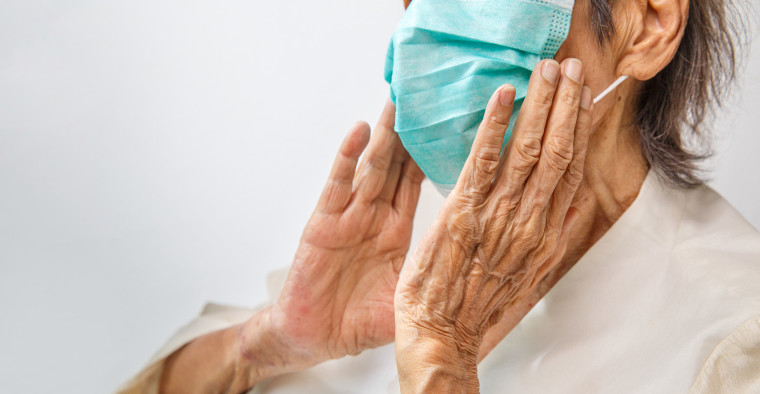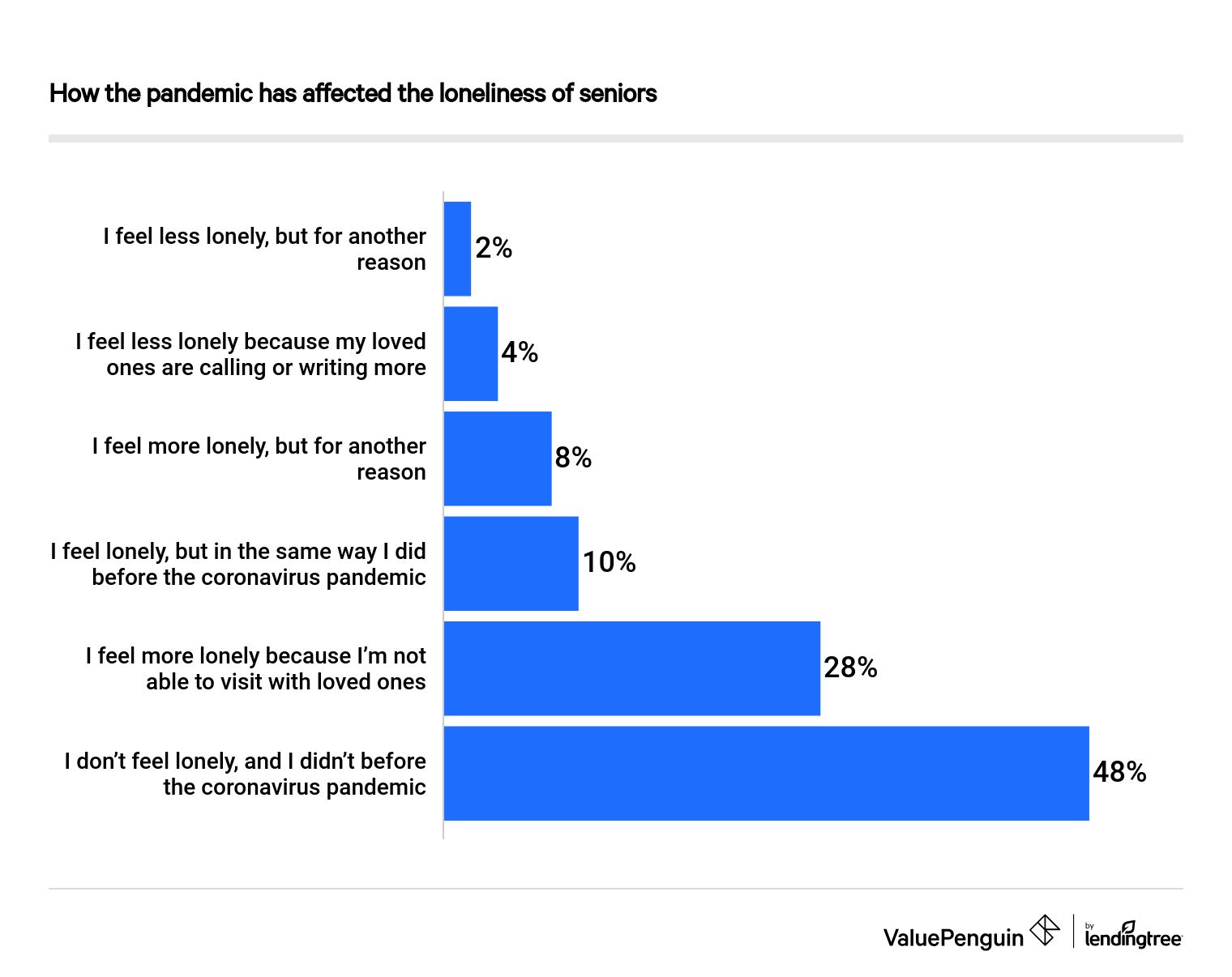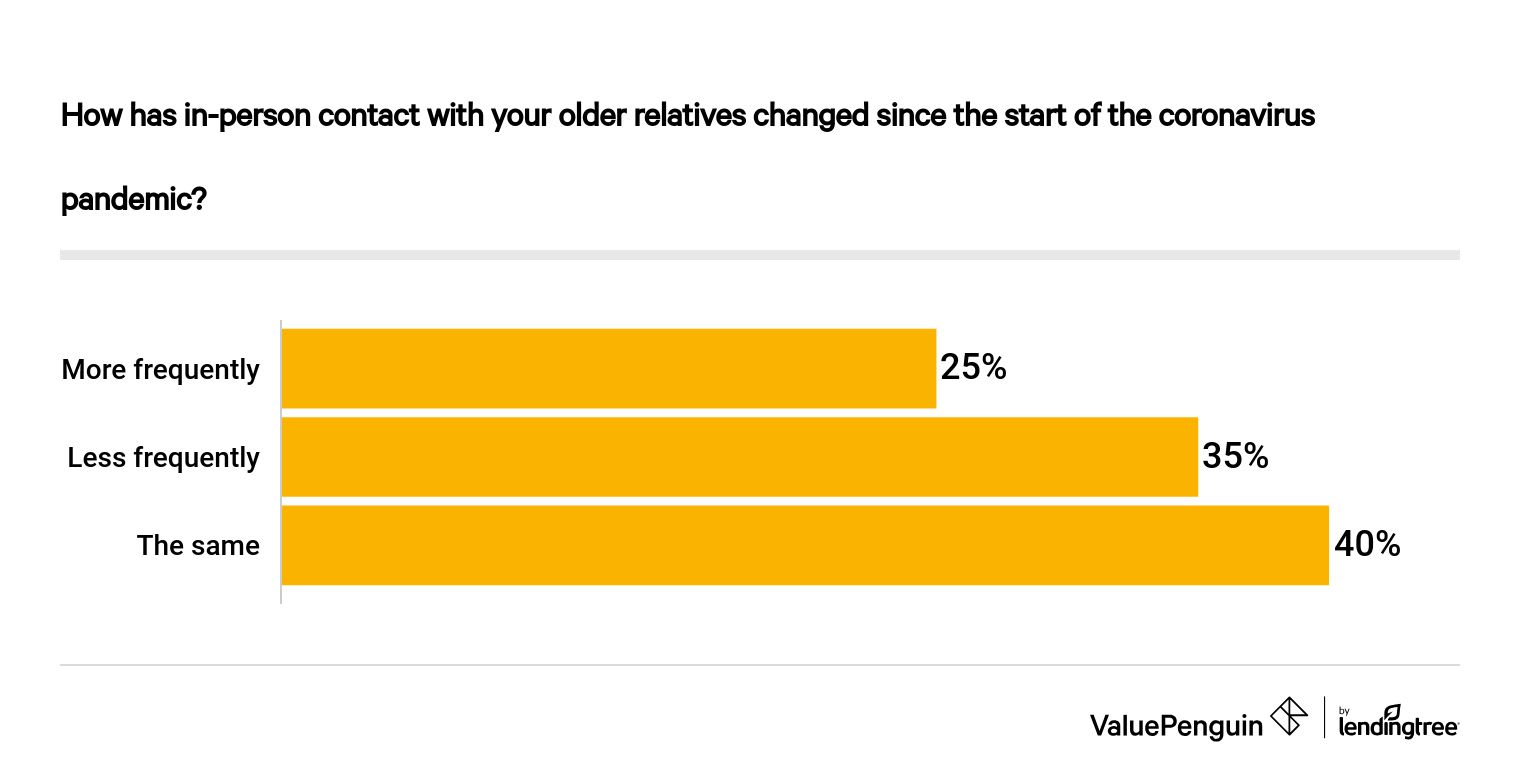Health Insurance
For Seniors, COVID-19 Has Generated a Wave of Loneliness and Worry

The coronavirus pandemic has brought new anxieties to seniors across the country. Given the virus's lethality to the elderly, it's unsurprising that a host of new concerns have emerged among the nation's oldest residents. But while ValuePenguin discovered that 36% of elderly people are feeling lonelier than ever, far more are worried about the safety and health of their younger relatives.
At the same time, the concerns of the elderly were met with very similar concerns expressed by their younger relatives. Close to half of both age groups are worried that their relatives will catch the virus, with 37% of younger people calling this out as their greatest fear.
A prevailing sense of concern for the mental and physical health of their elderly loved ones has led to an increase in contact since the pandemic emerged in spring — along with the potential for ill effects. While 44% of younger Americans stated that they have spoken to their older relatives more, the pandemic has caused one-quarter of young people to visit their older relatives in person much more frequently than before.
Key findings
- Thirty-six percent of seniors aged 75 and older report increased feelings of loneliness amid the pandemic, primarily because they’re not able to visit with loved ones. An additional 10% said they also feel lonely, but no more than they did prior to the pandemic.
- Forty-four percent of Americans said they’re talking to elderly relatives more frequently than they did before the pandemic. Still, the number one request from respondents aged 75 and older to their loved ones: call more often.
- One in three Americans — and 57% of those aged 18-23 — have argued with an elderly relative about the coronavirus pandemic. Of those who have, 23% don’t think their loved one is taking enough precautions, while 10% believe their relative is taking too many precautions.
- Just 14% of people are worried about their elderly friends or relatives being taken advantage of by scams, while fewer than 10% of the elderly are worried about their younger relatives losing income or their jobs.
- Forty-one percent of all consumers don’t trust nursing homes and assisted living facilities to keep residents safe amid the pandemic. Still, one-quarter of young people reported that they've actually increased their in-person visits to their older relatives during the pandemic.
Social distancing has increased lonely feelings in the elderly, but more than a quarter want to see even more rigorous distancing measures put in place
More than 36% of seniors over 75 shared that they've felt feelings of increased loneliness since the beginning of the coronavirus pandemic. Twenty-eight percent of these people said their loneliness was the direct result of not being able to visit their loved ones.
About one-quarter of elderly Americans wished their relatives would simply speak to them more on the phone.
While the elderly feel more lonely now, they don't necessarily want the rules governing social distancing to be relaxed. More than 78% of older Americans live alone or with a spouse, but fewer than one in 10 replied that they thought guidelines for social distancing are currently too strict. In fact, more than 28% advocated for even more stringent guidelines to be adopted.
The desire to reign in social distancing measures among older Americans is offset by fears over the safety of loved ones. Seventy percent of older people answered that the coronavirus pandemic has multiplied the worries they feel for younger loved ones.

About 46% were worried that the virus would infect their loved ones, a higher percentage than the nearly one in three who expressed feeling terrified about getting it themselves. Twenty-six percent of older Americans are worried that the pandemic is causing their loved ones to miss out on life experiences, while 15% feel their relatives aren't taking the virus seriously enough.
Most younger people worry about the health of older loved ones, with one in four concerned specifically about the mental well-being of the elderly.
More than 70% of all younger people are worried about the health of older friends and relatives. As is the case with their older counterparts, Americans under 75 years old were most likely to worry that their loved ones would get sick from coronavirus: About 56% were worried that their loved ones could get infected, with 37% identifying this as their greatest fear.
Just 26% of Americans under 75 years old expressed no concerns about their older relatives amidst the pandemic.
ValuePenguin found that younger people are much more worried about the mental health of their relatives than the elderly are. One-quarter of all Americans under 75 were anxious about the pandemic's effects on their elderly relatives' mental states. This is more than double the percentage of older respondents who said that they were concerned about the mental health of their younger loved ones — just about one in 10.
Moreover, fears about mental health were most prevalent among the country's youngest people. One-third of people who are a part of Gen Z revealed that they were concerned about their elderly relatives' mental well-being. Also, one-fifth of Gen Z said that the virus's effects on their relatives' mental health was the most pressing fear.
Percentages are displayed relative to share of total fears, rather than total responses. Those who said they feel no additional fears aren't accounted for here. Since people could answer more than once, the figures may not add up to 100%.
Compared to the abundance of other anxieties felt during this time, relatively few people in any age group are worried about the financial ramifications of the virus, including expensive health care costs. Just 14% of people are worried about their elderly friends or relatives being taken advantage of by scams, while fewer than 10% of the elderly are worried about their younger relatives losing income or their jobs.
Few people are worried that their loved ones aren't taking the virus seriously, but people may be unknowingly putting themselves in danger.
Despite the level of fear people have of relatives getting sick, there's no indication that there's widespread concern among families that their relatives and friends aren't taking the pandemic seriously. Fifteen percent of elderly people are worried about their loved ones taking the virus seriously, while just 10% of young people are worried about their older relatives.
Additionally, few people confessed they've had disagreements with their relatives about the seriousness of the virus. Just 23% stated they have confronted their relatives about how serious the virus is. Moreover, all groups of people are largely aligned in their feelings about emergency care during the coronavirus. Forty-one percent of all people are skeptical about the ability of nursing homes and long-term care facilities to take care of the elderly during the pandemic.

Yet, at the same time, many Americans could be endangering themselves. One-quarter of young people reported that they've actually increased their in-person visits to their older relatives during the pandemic. Additionally, four in 10 said they've not decreased the frequency of their in-person calls. This behavior may be in response to the desires of some elderly people, 11% of whom wish their relatives could visit them more even as the pandemic is ongoing.
According to health guidelines, the best way to avoid the costly financial and physiological effects of coronavirus is to continue practicing social distancing, especially in states where infections are increasing daily. While most health insurance plans, including Medicare, typically cover hospital stays from COVID-19, patients will still have to pay deductibles and any cost-sharing charges — which could be especially costly for extended stays.
Methodology
ValuePenguin commissioned Qualtrics to conduct an online survey of 1,109 Americans, with the sample base proportioned to represent the overall population. The survey was fielded Aug. 13-17, 2020.

